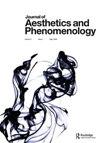Heidegger’s Fugue: Musicality and the Heraclitus Lectures
IF 0.2
0 PHILOSOPHY
引用次数: 0
Abstract
ABSTRACT Martin Heidegger rarely explicitly dealt with the topic of music. The Heraclitus lectures, delivered in 1943 and 1944, offer a notable exception. Heidegger here speaks openly of the “Lied der Erde” (“Earth’s song”). Most intriguing, perhaps, though, is the use of Fügung in relation to ἁρμονία (harmonia), which he links to understanding φὑσις (physis; the “emerging” character of the world) and being. Translated by Assaiante and Ewegen as “jointure,” Fügung bears a connection with the German Fuge, which contains the double meaning of joint and fugue. Drawing on a close reading of the Heraclitus lectures, this paper will explore the dual nature of Fügung with an eye towards laying the groundwork for understanding a latent musicality within Heidegger’s larger corpus, centering around perceiving, fugue, and their implications for listening to the “Earth’s song,” which will be read in literal, environmental terms as the soundscape or, perhaps, musical manifold.海德格尔赋格:音乐性与赫拉克利特讲座
摘要:马丁·海德格尔很少明确地论述音乐这个话题。赫拉克利特在1943年和1944年发表的演讲提供了一个明显的例外。海德格尔在这里公开地谈到了“大地之歌”。然而,最有趣的可能是Fügung在ἁρμρΓία(和声),他将其与理解φ联系起来ὑσις(physis;世界的“新兴”特征)和存在。由Assiante和Ewegen翻译为“jointure”,Fügung与德国赋格有联系,后者包含了joint和赋格的双重含义。在仔细阅读赫拉克利特讲座的基础上,本文将探讨Fügung的双重性质,以期为理解海德格尔更大语料库中潜在的音乐性奠定基础,围绕感知、赋格及其对聆听“地球之歌”的影响展开,这首歌将从字面、环境角度解读为声景,也许,音乐的多样性。
本文章由计算机程序翻译,如有差异,请以英文原文为准。
求助全文
约1分钟内获得全文
求助全文

 求助内容:
求助内容: 应助结果提醒方式:
应助结果提醒方式:


